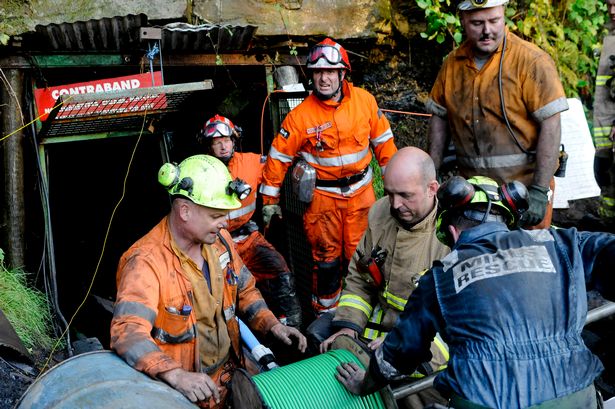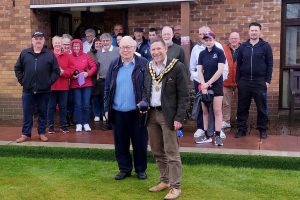THERE will be a full inquest into the deaths of four men who drowned in a south Wales coal mine will be held, a coroner has now ruled.
Charles Breslin, 62, David Powell, 50, Philip Hill, 44, and Garry Jenkins, 39, all died when the Gleision mine they were working in near Pontardawe flooded six years ago.
A public inquest into the 2014 incident was originally opened and adjourned in 2013, but after a trial the following year where the site manager and the company which ran the mine – MNS Mining Ltd – were found not guilty of manslaughter by gross negligence, the decision was taken by HM Coroner not to hold a full inquest into the deaths.
That decision angered the families of the victims who have long campaigned for a full inquest to be held. However, on Tuesday, Swansea Coroner’s Court heard that a full inquest will now be heard.
Undated South Wales Police handout photos of (from the left) Garry Jenkins, 39, Phillip Hill, 45, David Powell, 50, and Charles Breslin, 62, the four miners that died following an accident at Gleision Colliery
Acting senior coroner Colin Phillips told the hearing at Swansea Guildhall he acknowledged that resuming the inquest would be challenging, but he insisted it was practical and would be worthwhile. The new inquiry will examine the state regulation of mining at Gleision in the years leading up to the disaster.
The coroner said: “In simple terms, there is more than a suspicion in my view, that coal reserves were illegally worked and not mapped and safety regulations not strictly enforced for over a decade. Whilst there was a regulatory framework in place which on the face of it was not defective, I am satisfied it is arguable there was a failure to implement it.
“As a matter of common sense, it is important to know the extent of coal worked as these areas would be predisposed to the collection of water and the prevention of inrush regulations are designed to protect miners from such catastrophes. I am accordingly satisfied of evidence that the overall regulatory framework governing safe mine regulation at the material time failed to avoid the inherent risks to life from such mining as a result of inadequate implementation of the framework. The state failures to implement the regulatory framework thereby created an operational risk to life about which the state was or ought to have been aware. I am further satisfied that on current evidence it is arguable that such a risk having been created no reasonable steps appear to have been taken, as was mandated, to ameliorate that risk.
“Finally I am satisfied that it is arguable that had those alleged regulatory failures not taken place there was a real prospect of the deaths being avoided.”
He added: “On balance I am satisfied that resumption of these inquest, albeit challenging and complex, is a practical proposition.”
The coroner said in the first instance he would be seeking disclosure of all the relevant the investigation files held by South Wales Police and full transcripts from the 2014 criminal trial, and he said he hoped to arrange a meeting with detective chief inspector Mark Lewis or a suitable deputy. A pre-inquest review hearing will be held early in the new year to address the issues which it is intended the inquest will cover.
The four colliers were killed almost instantly when 600,000 gallons of water rushed in as they broke through to a previously mined area of the colliery as part of a scheme to improve air quality on September 15, 2011. As friends and family of the miners kept vigil at a community centre as they waited for news of their loved ones overnight specialist divers went into the mine but had to abandon their efforts after about 30m. Rescuers had hoped the divers could assess the situation before all the water had been pumped out but debris had made the water murky.
The rescue mission resumed at 4.20am on September 16 and fresh teams were drafted in to replace colleagues who had been working non-stop for 12 hours. But four hours later the first body was discovered and was subsequently identified as Garry Jenkins.
Later that afternoon the body of David Powell was found. At 3.10pm a third body was discovered and was later identified to be Phillip Hill and at 6pm the body of Charles Breslin was found.
Three years later, mine manager Malcolm Fyfield and the mine’s owners MNS went on trial at Swansea Crown Court accused of manslaughter through gross negligence. Both Mr Fyfield and MNS were found not guilty, after a three month long trial.
After the verdicts a statement from the family of the four miners was read out on the court steps. It said: “Today has been a difficult day for us all, as have the last two and a half years since we lost our loved ones at the Gleision mine. We miss Gary, Phillip, Charles, and David deeply. Not a day has passed without wishing they were still with us. The events of September 15, 2011, will stay with us for the rest of our lives.”
Family members of the four miners pictured outside Swansea coroner’s court (Image: Plaid Cymru)
However, while criminal proceedings in the disaster came to an end, families of the dead miners felt that there were still many unanswered questions concerning the tragedy.
Speaking outside the Guildhall, Charlie Breslin’s widow Mavis said: “It’s a big relief to know that at last we will have some questions answered – we’ve waited long enough for it. What questions remained unanswered? Well, what lead up to the deaths, can this be prevented from happening in the future .”
Solicitor Michael Imperato, who is representing the families of the miners, said: “The families are really pleased and it’s been a long fight for them. They welcome the coroner’s ruling today and that the inquest will be re-opened. The coroner actually said that there was evidence of failings by the state that led to the deaths of these men. The family welcome the re-opening of the inquest and the chance to look at these failings in much more detail and get the answers they have been seeking for all these years.”
Plaid Cymru Member of Senedd for South Wales West, Sioned Williams also welcomed the decision. She said: “Despite the absurd amount of time that it has taken to get to this point, I welcome today’s decision by the Coroner for Swansea and Neath Port Talbot to conduct a full inquest into the Gleision colliery disaster.
“For too long, the families have been sidelined, and their questions have remained unanswered. While today’s decision won’t bring back those who tragically lost their lives 11 years ago, a full inquest will hopefully provide those answers. Today’s decision to re-open an inquest provides some hope that the wishes of the families will finally now be listened to.”
In 2015 the HSE’s report concluded that a mine plan found in an office at the colliery clearly highlighted the area where the incident happened as having underground water.


















